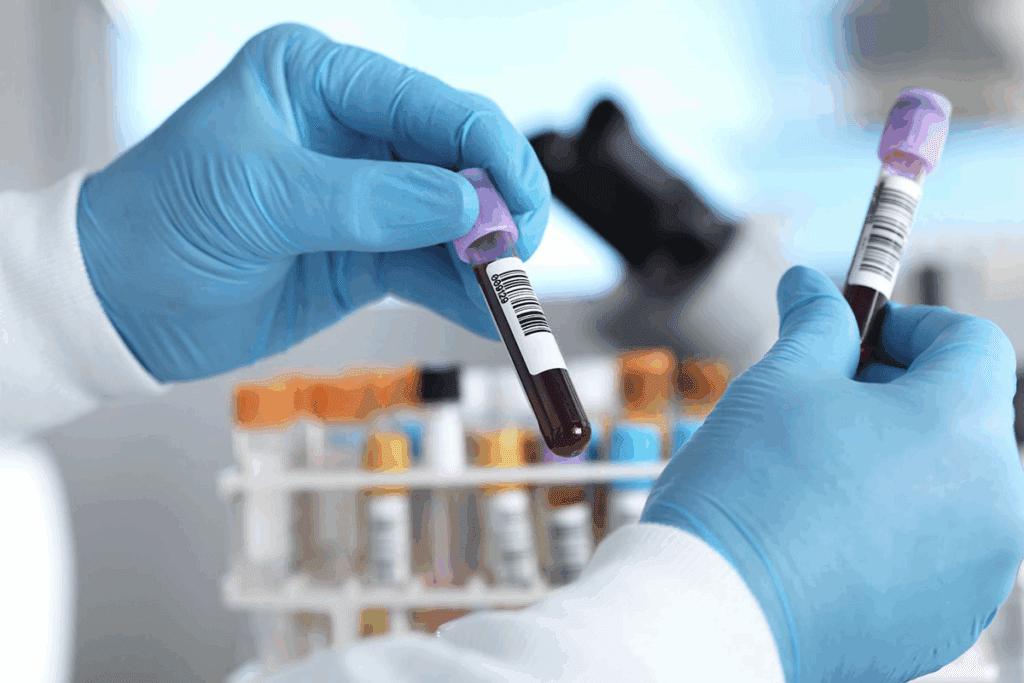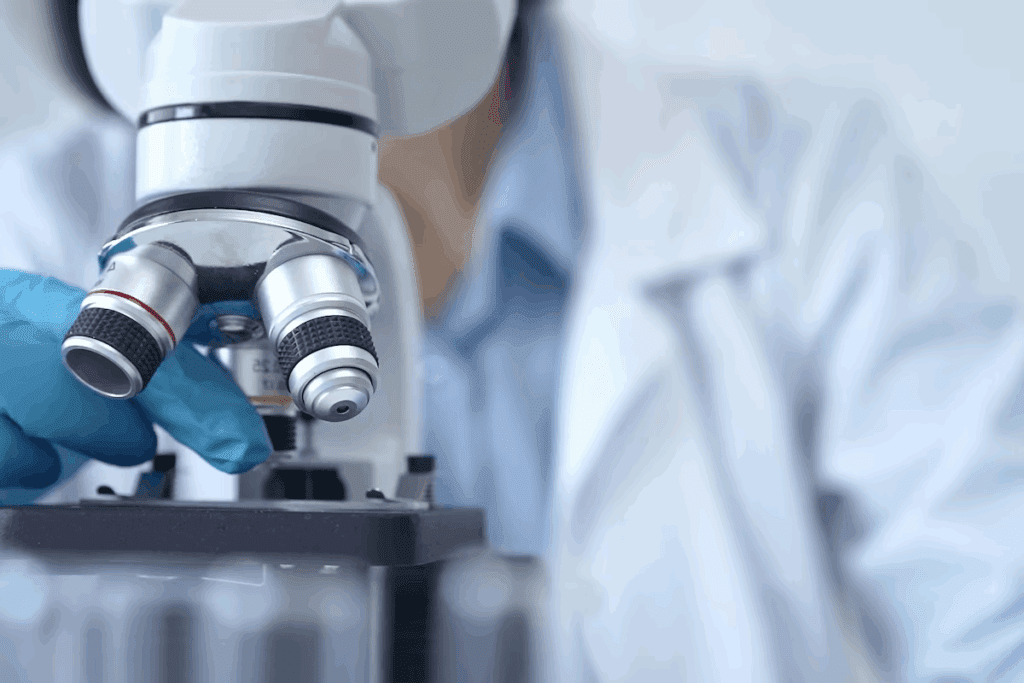Last Updated on October 21, 2025 by mcelik

A Complete Blood Count (CBC) is a common blood evaluation. It checks overall health and finds issues like anemia, infection, and leukemia. Many people also wonder about the CBC test duration, which is usually quite short.
The time for a CBC test can change. It depends on the lab’s work and the person’s health.
Knowing how long a CBC takes is key for those waiting for results. It helps set expectations and lowers stress.
Knowing what a CBC test is is important for those getting it. A Complete Blood Count (CBC) test is a key tool in medicine. It gives important info about the blood’s parts.
A CBC looks at several blood parts, including:
These parts give a full view of blood health. They help find different health issues.
CBC tests are often done for many reasons, like:
Healthcare providers use CBC test results to understand a patient’s health. They can spot problems early.
CBC test results are very important. For example:
Knowing what a CBC test measures and why it’s done helps patients understand their results better.

Knowing how long a CBC test takes is important for both patients and doctors. The time it takes can change based on the lab’s workload and how fast they test.
A CBC test usually takes a few hours to a couple of days from start to finish. Most people wait about 24 hours for their results. But this time can be shorter or longer based on different factors.
Factors influencing the total duration include:
The CBC test process has several steps that add up to the total time:
The waiting times between each step can differ a lot. For example, the time from blood draw to sample prep can be immediate or several hours, depending on the lab. The time from analysis to reporting results also varies based on the lab’s workload and the test’s priority.
To avoid delays, some labs offer:
By knowing these steps and their times, patients and doctors can better plan for CBC test results.
Collecting blood for a CBC test is simple and fast. It usually takes just a few minutes.
Before the blood draw, patients must register and may need to fast for some tests. Efficient registration processes make the experience smoother.
Registration checks patient info and confirms the tests. It’s key to ensure the right tests are done and the results are correct.
The blood draw itself is quick. It takes about 1-3 minutes to get the blood sample. The time can change based on the vein and the phlebotomist’s skill.
After drawing blood, it’s handled carefully for testing. The sample is labeled right and stored properly until lab processing.
Proper handling of the blood is vital for accurate CBC test results. Labs follow strict rules to avoid contamination or damage.

The CBC test goes through many stages in the lab, from getting the sample to getting the results. Knowing these steps helps us see how fast and accurate lab tests are today.
When samples arrive at the lab, they are checked and logged into the LIS. This step makes sure the sample is good to go for testing. It’s key to keeping track of the sample and keeping patients safe.
After logging, samples get ready for testing. This might include spinning, splitting, or other steps to get the blood ready. The method used can change how fast the lab processing time is.
Today’s labs use automated analyzers to test CBC samples fast. These machines can do many tests at once on one sample. This makes the automated analyzer speed very important for lab efficiency.
Labs make sure CBC results are right and reliable with strict quality control measures. They calibrate equipment, test control samples, and join external testing programs. These steps are vital for keeping lab standards high.
With the latest tech and strict quality checks, labs can give fast and accurate CBC results. This helps doctors take better care of their patients.
Many things can change how long a CBC test takes. Knowing these can help both patients and doctors understand how long it will take.
Things about the patient can really affect how long a CBC test takes. For example, if it’s hard to get blood, it might take longer. Kids and older adults might need extra care, which can also slow things down.
The work the lab does and how many people are there can change how fast tests are done. If there are a lot of samples and not enough staff, things can get backed up.
Table: Impact of Laboratory Workload on CBC Test Duration
| Laboratory Workload | Average Processing Time |
| Low | 1-2 hours |
| Moderate | 2-4 hours |
| High | 4-6 hours |
The tools the lab uses can also change how long a test takes. Older or simpler equipment might be slower than newer, faster machines.
How long it takes to get blood samples to the lab is very important. Samples from far away or needing special care might take longer to get there.
CBC testing varies a lot depending on where it’s done. It can be in a hospital lab, a doctor’s office, an outpatient clinic, or a reference lab. Each place has its own way of doing tests and how fast they can do them.
Hospital labs have the best equipment for CBC tests. They use advanced machines that can test many samples at once.
On-site lab efficiency means tests can be done quickly. Usually, it takes 1-2 hours.
Doctors’ offices can’t do as many tests as hospitals. Some have basic labs, while others send samples elsewhere.
The time it takes to get CBC results varies. It can be fast if done in-house or take days if sent out.
Outpatient clinics have labs that are better than doctors’ offices but not as good as hospitals. They aim for a balance in testing.
Reference labs focus on many tests, including CBCs. They handle lots of samples for different doctors.
Even though there can be delays, many reference labs are quick. Results usually come in 24 to 48 hours.
| Healthcare Setting | Typical Turnaround Time | Key Characteristics |
| Hospital Laboratory | 1-2 hours | Advanced equipment, high volume capacity |
| Doctor’s Office | Varies (minutes to days) | Limited in-house capabilities, may send to external labs |
| Outpatient Clinic | 2-24 hours | Dedicated labs, a balance between on-site and external testing |
| Reference Laboratory | 24-48 hours | Specialized facilities serve multiple healthcare providers |
In conclusion, where CBC testing is done affects how fast and efficiently it is. Knowing these differences helps both healthcare providers and patients.
It’s important to know the difference between routine and STAT CBC testing. CBC tests can be done quickly or slowly, affecting when you get your results.
Routine CBC tests follow the lab’s usual steps. This can take a few hours to a whole day. It depends on how busy the lab is and the equipment they use.
The time it takes for routine CBC tests can vary a lot. Hospital labs might do them in 1-2 hours. But clinics might take longer because they send samples to another lab.
STAT CBC tests are done first because they’re urgent. These tests are needed quickly, like in emergencies. Labs have special ways to make sure STAT tests are done fast.
When a CBC test is marked as STAT, it’s done right away. This can take 30 minutes to 1 hour. Labs use special equipment and trained staff for urgent samples.
The urgency of a CBC test affects how fast it’s done. Test prioritization is key in labs. It makes sure urgent tests are done quickly and routine tests are done when they can be.
Labs use different ways to decide which tests are most urgent. This helps healthcare providers and patients know when to expect results.
Automated analyzers have changed blood analysis a lot. They make it faster and more accurate. Now, labs use these machines a lot to test blood samples quickly.
These machines have made blood analysis quick and precise. They can test hundreds of samples every hour. They do tests like complete blood counts (CBC) and differential counts.
The modern analyzers can do many things. They include:
Automated analyzers make blood analysis faster and more accurate. They cut down on mistakes made by humans.
Even with automated analysis, some cases need manual review. These include:
In these cases, experts do manual reviews. They give a more detailed and accurate diagnosis.
Automated analyzers have cut down the time to get blood analysis results. Automated results are usually ready in hours. But manual reviews can take longer.
Even with manual reviews, automation makes labs work faster. This means results come back quicker.
New technology is making blood analysis even faster and more accurate. Things like artificial intelligence (AI) and machine learning (ML) are being used. They help in many ways.
As technology keeps getting better, we’ll see even quicker and more precise blood analysis. This will help improve patient care a lot.
It’s important to know how CBC test results are reported and delivered. This is true for both patients and healthcare providers. The ways we get these results have changed a lot with new technology. This makes getting test results faster and easier.
Now, many doctors use electronic medical records (EMRs) to keep patient data. This includes CBC test results. EMRs help put test results right into a patient’s medical history. This makes care more complete.
Using EMRs has made reporting faster. It cuts down the time it takes to get results to doctors.
Patient portals are another way to get CBC test results. These online sites let patients see their health info safely. When can you see your CBC results on a patient portal? Usually, it’s within 24 to 48 hours after the test.
Even though digital ways are common, some places send CBC results by mail or for pickup. How long it takes to get these results by mail can be longer. It often takes a few days.
Before patients get their CBC test results, a doctor often checks them. This makes sure the results are right and any next steps are clear. This extra step is key to high-quality patient care.
What method is used depends on the healthcare place, what the patient wants, and how urgent the results are. As technology gets better, we’ll see even better ways to share CBC test results.
There are special things that can change how long a CBC test takes. These things can affect how long it takes to get ready for the test, to do the test, and to get the results.
Getting blood from kids can be tough. Their veins are small, and they might feel scared or upset. This can make the test take longer and require more skill.
Specialized pediatric phlebotomists are trained to make it easier. They use smaller needles and try to distract the child to make it less painful.
Some people have veins that are hard to find or use. This means it might take more tries to get the blood. It can make the test longer.
Healthcare providers might try different veins or ask for help from someone more experienced. This can help get the blood needed for the test.
Problems with the blood sample can make it take longer to get the test results. These problems include broken blood cells, clots, or not enough blood.
Labs have strict rules for handling blood samples. This includes careful labeling, storing, and moving the samples. This helps avoid problems with the blood.
| Sample Quality Issue | Potential Cause | Resolution |
| Hemolysis | Rough handling during collection or transport | Recollection with gentle handling |
| Clotting | Insufficient mixing with the anticoagulant | Recollection with proper mixing |
| Insufficient Volume | Inadequate blood draw | Recollection with a larger volume |
Some parts of the CBC test require the patient to fast beforehand. This means the test has to be scheduled at the right time for fasting.
Doctors and nurses have to plan the fasting times carefully. This helps avoid delays in getting the test done and the results back.
Knowing when you’ll get your CBC results can make you feel less anxious. The time it takes can change a lot. It depends on where you got the test and how complex it was.
The time to get CBC results varies by where you got the test. Hospital laboratories usually have results in 1-2 hours. This is because they deal with urgent cases often.
In outpatient clinics and doctors’ offices, it might take longer. It could be a few hours or even a day. This depends on whether they have a lab there or send samples elsewhere.
If you haven’t got your CBC results, it’s time to check in with your doctor. For most places, wait 2-3 business days before asking. But your doctor might tell you to wait longer.
There are a few reasons why CBC results might be late. These include:
Knowing these reasons can help you feel better if your results are late.
The time it takes for a CBC test can change based on a few things. These include where you get the test and how busy the lab is. Knowing this helps set the right expectations for when you’ll get your results.
How long a CBC test takes includes the time to draw blood, process it in the lab, and report the results. The part about analyzing blood samples is key. It uses special machines to check the blood.
How fast you get your results can vary a lot. It might be a few hours or a few days, depending on whether it’s urgent or not. Who is working in the lab and how fast they work also plays a big role.
Understanding what affects the time of a CBC test helps both patients and doctors. It lets them plan better for when they’ll get results. This makes managing tests and making decisions faster and more effective.
A CBC test usually takes 1-2 hours. This includes the time from the blood draw to getting the results. It depends on the lab’s workload and the test’s complexity.
Several things can affect how long a CBC test takes. These include the lab’s workload, if a manual review is needed, and how long it takes to transport the sample. Also, if it’s a routine or urgent test can make a difference.
The blood draw itself only takes a few minutes. But getting ready and registered can add to the overall time at the site.
Routine CBC tests follow the lab’s standard schedule. STAT tests, on the other hand, are for urgent cases. This makes STAT tests much quicker.
Automated analyzers make CBC testing faster. They reduce the time needed for analysis, leading to quicker results.
Yes, the setting where you get your CBC test done can affect the time. Hospitals, doctors’ offices, and reference labs have different times and procedures.
Some special considerations can affect CBC test timing. These include blood draws on kids, difficult access, sample quality, and fasting needs.
Results can be given through electronic records, patient portals, or in person. The time it takes depends on the method and how quickly the doctor reviews it.
Results usually come within a few hours to a day. If they’re late, it’s best to check with your healthcare provider.
If your results are late, contact your healthcare provider. Ask about the status and what might have caused the delay.
Subscribe to our e-newsletter to stay informed about the latest innovations in the world of health and exclusive offers!